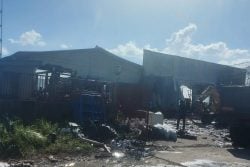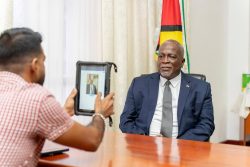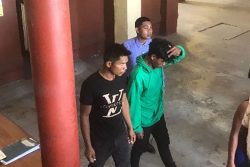SKOPJE (Reuters) – The opposition in Macedonia was ejected from parliament yesterday for brawling, prompting it to pledge to boycott the chamber and initiate a campaign of civil disobedience after a rancorous disagreement over the size of next year’s budget.
The incident occurred after thousands of pro- and anti-government demonstrators clashed outside parliament in Skopje, the capital, and allowed the government to push through a vote in favour of its contested budget proposals in which only just over half of MPs took part.
As opposition MPs scuffled with pro-government counterparts to try to prevent a debate on a budget they felt was too profligate from getting underway, security guards evacuated parliament speaker Trajko Veljanovski from the plenary hall.
Security guards then forced opposition deputies out of the parliament building who joined their supporters in the streets as the government pushed through a 64-4 vote in favour of its own budget proposal. Parliament has 120 members.
Branko Crvenkovski, the head of the opposition Social Democrats, accused the centre-right government of Nikola Gruevski of suspending democracy.
“From today, Macedonia has no constitution, no parliament, no government. We have a dictatorial regime on one side and the people on the other,” Crvenkovski said.
“From tomorrow we will begin (a campaign of) civil disobedience,” he told a crowd, without elaborating further.
The government proposed a 148-billion-denari ($3.2 billion) budget for 2013 last month, forecasting a deficit of 3.5 per cent of gross domestic product. It put growth next year at 2 per cent of GDP.
But the leftwing opposition condemned the budget proposal as profligate at a time of economic crisis and demanded a cut in it equivalent to about $260 million. The government refused and the opposition then submitted about a thousand amendments to the draft before tensions flared yesterday.
Outside parliament, police had to intervene to separate pro- and anti-government supporters who pelted one another with bottles and stones. Local media said at least six people had been injured.
The ruling rightist VMRO-DPMNE party accused the opposition of attempting to topple the government. “To do that they (opposition) mobilised their supporters, some of whom have a criminal background. … This will not succeed,” the party said in a statement.
Earlier, Gruevski, who is also head of the VMRO-DPMNE, accused Crvenkovski of masterminding the crisis: “This is all about the vanity of one man, of (Branko) Crvenkovski and his political survival,” he said.
Macedonia’s economy came out of two quarters of recession in the third quarter of 2012, posting 0.3 per cent GDP growth.
The central bank has cut its 2012 growth forecast to zero from 2.4 per cent, reflecting the negative effect of the euro zone crisis across the Western Balkans, but sees growth perking up to 2.6 per cent in 2013.





